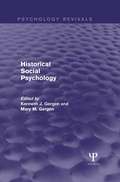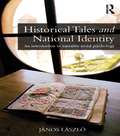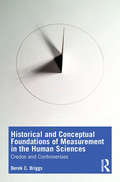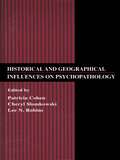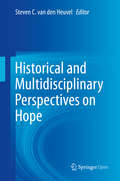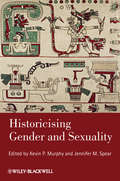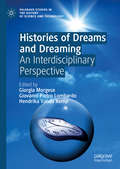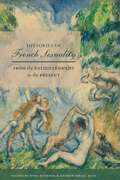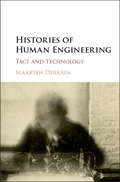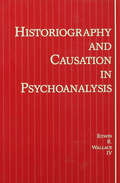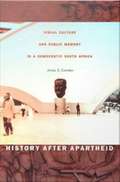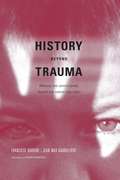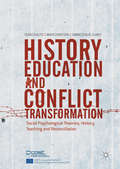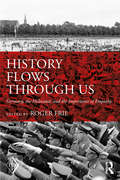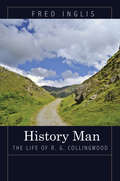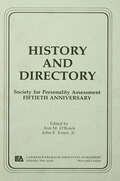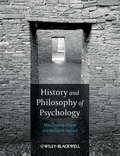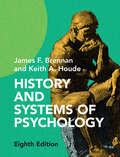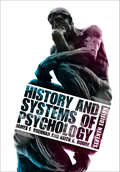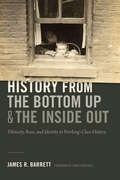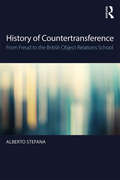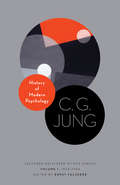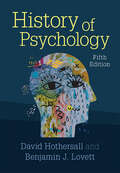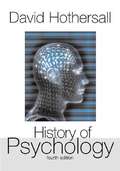- Table View
- List View
Historical Social Psychology (Psychology Revivals)
by Kenneth J. Gergen Mary M. GergenThe vast majority of research in social psychology focuses on momentary events: an attitude is changed, dissonance is reduced, a cognition is primed, and so on. Little attention is a paid to the unfolding of events over time, to social life as an ongoing process in which events are related in various ways as life unfolds. Originally published in 1984, Historical Social Psychology opens a space for theory and research in which temporal process is central. Contributors to this broad-ranging work provide a rich range of perspectives, from the theoretical to the methodological, from micro-sequences to the life-span, and from contemporary history to the long durée. Together, these authors set the stage for a major shift in the focus of social psychological inquiry.
Historical Tales and National Identity: An introduction to narrative social psychology
by János LászlóSocial psychologists argue that people’s past weighs on their present. Consistent with this view, Historical Tales and National Identity outlines a theory and a methodology which provide tools for better understanding the relation between the present psychological condition of a society and representations of its past. Author Janos Laszlo argues that various kinds of historical texts including historical textbooks, texts derived from public memory (e.g. media or oral history), novels, and folk narratives play a central part in constructing national identity. Consequently, with a proper methodology, it is possible to expose the characteristic features and contours of national identities. <P><P>In this book Laszlo enhances our understanding of narrative psychology and further elaborates his narrative theory of history and identity. He offers a conceptual model that draws on diverse areas of psychology - social, political, cognitive and psychodynamics - and integrates them into a coherent whole. In addition to this conceptual contribution, he also provides a major methodological innovation: a content analytic framework and software package that can be used to analyse various kinds of historical texts and shed new light on national identity. In the second part of the book, the potential of this approach is empirically illustrated, using Hungarian national identity as the focus. The author also extends his scope to consider the potential generalizations of the approach employed. <P><P>Historical Tales and National Identity will be of great interest to a broad range of student and academic readers across the social sciences and humanities: in psychology, history, cultural studies, literature, anthropology, political science, media studies, sociology and memory studies.
Historical and Conceptual Foundations of Measurement in the Human Sciences: Credos and Controversies
by Derek C. BriggsHistorical and Conceptual Foundations of Measurement in the Human Sciences explores the assessment and measurement of nonphysical attributes that define human beings: abilities, personalities, attitudes, dispositions, and values. The proposition that human attributes are measurable remains controversial, as do the ideas and innovations of the six historical figures—Gustav Fechner, Francis Galton, Alfred Binet, Charles Spearman, Louis Thurstone, and S. S. Stevens—at the heart of this book. Across 10 rich, elaborative chapters, readers are introduced to the origins of educational and psychological scaling, mental testing, classical test theory, factor analysis, and diagnostic classification and to controversies spanning the quantity objection, the role of measurement in promoting eugenics, theories of intelligence, the measurement of attitudes, and beyond. Graduate students, researchers, and professionals in educational measurement and psychometrics will emerge with a deeper appreciation for both the challenges and the affordances of measurement in quantitative research.
Historical and Geographical Influences on Psychopathology
by Patricia Cohen Cheryl Slomkowski Lee N. RobinsThis book begins with the assumption that a deep understanding of the origins of psychopathology, human dysfunction, and their course is fundamental to the quest for the good society, and perhaps, even to our survival as a species. The studies presented compare prevalences and risk factors across time and place, and make use of concepts and methods from history, geography, sociology, anthropology, economics, psychology, social and medical services research, social policy, psychiatry, and epidemiology. Collectively, they illustrate the methods and methodological difficulties involved in the effort to achieve a deep understanding and provide important insights into the disorders and dysfunctions that are investigated.
Historical and Multidisciplinary Perspectives on Hope
by Steven C. van den HeuvelThis open access volume makes an important contribution to the ongoing research on hope theory by combining insights from both its long history and its increasing multi-disciplinarity. In the first part, it recognizes the importance of the centuries-old reflection on hope by offering historical perspectives and tracing it back to ancient Greek philosophy. At the same time, it provides novel perspectives on often-overlooked historical theories and developments and challenges established views. The second part of the volume documents the state of the art of current research in hope across eight disciplines, which are philosophy, theology, psychology, economy, sociology, health studies, ecology, and development studies. Taken together, this volume provides an integrated view on hope as a multi-faced phenomenon. It contributes to the further understanding of hope as an essential human capacity, with the possibility of transforming our human societies.
Historical and Philosophical Foundations of Psychology
by Martin FarrellThis textbook connects the big ideas and key thinkers of psychology and philosophy in a clear and cohesive theoretical narrative. Students are led to understand the relations between different schools of thought, and to connect the various thinkers, theories and facts in psychology's history. Focusing on the major ideas that have reoccurred throughout history, such as the mind-body problem and the role of the mind in our experience, Martin Farrell shows how specific thinkers have explored the same ideas, but in different ways, leading to distinct schools of thought. The coherent narrative enables students to see the bigger picture, through which the historical and conceptual roots of psychology can be easily understood.
Historicising Gender and Sexuality (Gender and History Special Issues #9)
by Kevin P. Murphy Jennifer M. SpearHistoricising Gender and Sexuality features a diverse collection of essays that shed new light on the historical intersections between gender and sexuality across time and space. Demonstrates both the particularities of specific formulations of gender and sexuality and the nature of the relationship between the categories themselves Presents evidence that careful and contextualised analysis of the shifting relationship of gender and sexuality illuminates broader historical processes
Histories of Dreams and Dreaming: An Interdisciplinary Perspective (Palgrave Studies in the History of Science and Technology)
by Giorgia Morgese Giovanni Pietro Lombardo Hendrika Vande KempIn the late nineteenth century, dreams became the subject of scientific study for the first time, after thousands of years of being considered a primarily spiritual phenomenon. Before Freud and the rise of psychoanalytic interpretation as the dominant mode of studying dreams, an international group of physicians, physiologists, and psychiatrists pioneered scientific models of dreaming. Collecting data from interviews, structured observation, surveys, and their own dream diaries, these scholars produced a large body of early research on the sleeping brain in the late nineteenth and early twentieth centuries. This book uncovers an array of case studies from this overlooked period of dream scholarship. With contributors working across the disciplines of psychology, history, literature, and cultural studies, it highlights continuities and ruptures in the history of scientific inquiry into dreams.
Histories of French Sexuality: From the Enlightenment to the Present
by Nina Kushner Andrew Israel RossHistories of French Sexuality contends that the history of sexuality is at a crossroads. Decades of scholarship have shown that sexuality is implicated in a wide range of topics, such as studies of reproduction, the body, sexual knowledge, gender identity, marriage, and sexual citizenship. These studies have broadened historical narratives and interpretations of areas such as urbanization, the family, work, class, empire, the military and war, and the nation. Yet while the field has evolved, not everyone has caught on, especially scholars of French history. Covering the early eighteenth century through the present, the essays in Histories of French Sexuality show how attention to the history of sexuality deepens, changes, challenges, supports, or otherwise complicates the major narratives of French history. This volume makes a set of historical arguments about the nature of the past and a larger historiographical claim about the value and place of the field of the history of sexuality within the broader discipline of history. The topics include early empire-building, religion, the Enlightenment, feminism, socialism, formation of the modern self, medicine, urbanization, decolonization, the social world of postwar France, and the rise of modern and social media.
Histories of Human Engineering: Tact and Technology
by Maarten DerksenThe dream of control over human behaviour is an old dream, shared by many cultures. This fascinating account of the histories of human engineering describes how technologies of managing individuals and groups were developed from the nineteenth century to the present day, ranging from brainwashing and mind control to Dale Carnegie's art of dealing with people. Derksen reveals that common to all of them is the perpetual tension between the desire to control people's behaviour and the resistance this provokes. Thus to influence other people successfully, technology had to be combined with tact: with a personal touch, with a subtle hint, or with outright deception, manipulations are made palatable or invisible. Combining psychological history and theory with insights from science and technology studies and rhetorical scholarship, Derksen offers a fresh perspective on human engineering that will appeal to those interested in the history of psychology and the history of technology.
Historiography and Causation in Psychoanalysis
by Edwin R. Wallace, IVWhat do the psychoanalyst and the historian have in common? This important question has stimulated a lively debate within the psychoanalytic profession in recent years, bearing as it does on the very nature of the psychoanalytic enterprise. Edwin Wallace, a clinician with training in the history and philosophy of science, brings a ranging scholarly perspective to the debate, mediating between rival perspectives and clarifying the issues at stake in the process of offering his own thoughtful conception of the historical nature of psychoanalysis. For Wallace, the procedures, problems, and interpretive possibilities of psychoanalysis and history are strikingly constant and mutually illuminating. He insists, further, that the fundamentally historical nature of psychoanalysis poses no threat to its scientific dignity. In arriving at this verdict, Wallace pushes beyond his expansive treatment of the many parallels between history and psychoanalysis to a systematic consideration of the problem of causation in both disciplines. Tracing the historical background of causation in science, philosophy, history, and analysis, he offers a logical analysis of determinism and a critique of causal language in psychoanalysis while adumbrating the historical character of psychoanalytic explanation. Historiography and Causation in Psychoanalysis is a thought-provoking work that cuts across disciplinary boundaries. It will cultivate the historical sensibilities of all its clinical readers, broadening and deepening the intellectual perspective they bring to the dialogue about the nature of psychoanalytic work. Timely and rewarding reading for analysts, psychiatrists, and clinical psychologists, it will be welcomed by historians and philosophers as well.
History After Apartheid: Visual Culture and Public Memory in a Democratic South Africa
by Annie E. CoombesThe democratic election of Nelson Mandela as president of South Africa in 1994 marked the demise of apartheid and the beginning of a new struggle to define the nation's past. History after Apartheid analyzes how, in the midst of the momentous shift to an inclusive democracy, South Africa's visual and material culture represented the past while at the same time contributing to the process of social transformation. Considering attempts to invent and recover historical icons and narratives, art historian Annie E. Coombes examines how strategies for embodying different models of historical knowledge and experience are negotiated in public culture--in monuments, museums, and contemporary fine art. History after Apartheid explores the dilemmas posed by a wide range of visual and material culture including key South African heritage sites. How prominent should Nelson Mandela and the African National Congress be in the museum at the infamous political prison on Robben Island? How should the postapartheid government deal with the Voortrekker Monument mythologizing the Boer Trek of 1838? Coombes highlights the contradictory investment in these sites among competing constituencies and the tensions involved in the rush to produce new histories for the "new" South Africa. She reveals how artists and museum officials struggled to adequately represent painful and difficult histories ignored or disavowed under apartheid, including slavery, homelessness, and the attempted destruction of KhoiSan hunter-gatherers. Describing how contemporary South African artists address historical memory and the ambiguities uncovered by the Truth and Reconciliation Commission, Coombes illuminates a body of work dedicated to the struggle to simultaneously remember the past and move forward into the future.
History Beyond Trauma
by Francoise Davoine Jean-Max Gaudilliere Susan FairfieldIn the course of nearly thirty years of work with patients in psychiatric hospitals and private practice, Francoise Davoine and Jean-Max Gaudilliere have uncovered the ways in which transference and countertransference are affected by the experience of social catastrophe. Handed down from one generation to the next, the unspoken horrors of war, betrayal, dissociation, and disaster in the families of patient and analyst alike are not only revived in the therapeutic relationship but, when understood, actually provide the keys to the healing process. The authors present vivid examples of clinical work with severely traumatized patients, reaching inward to their own intimate family histories as shaped by the Second World War and outward toward an exceptionally broad range of cultural references to literature, philosophy, political theory, and anthropology. Using examples from medieval carnivals and Japanese No theater, to Wittgenstein and Hannah Arendt, to Sioux rituals in North Dakota, they reveal the ways in which psychological damage is done--and undone. With a special focus on the relationship between psychoanalysis and the neurosciences, Davoine and Gaudilliere show how the patient-analyst relationship opens pathways of investigation into the nature of madness, whether on the scale of History--world wars, Vietnam--or on the scale of Story--the silencing of horror within an individual family.In order to show how the therapeutic approach to trauma was developed on the basis of war psychiatry, the authors ground their clinical theory in the work of Thomas Salmon, an American doctor from the time of the First World War. In their case studies, they illustrate how three of the four Salmon principles--proximity, immediacy, and expectancy--affect the handling of the transference-countertransference relationship. The fourth principle, simplicity, shapes the style in which the authors address their readers--that is, with the same clarity and directness with which they speak to their patients.
History Education and Conflict Transformation
by Mario Carretero Charis Psaltis Sabina Čehajić-ClancyThis book is open access under a CC BY 4. 0 license. This volume discusses the effects, models and implications of history teaching in relation to conflict transformation and reconciliation from a social-psychological perspective. Bringing together a mix of established and young researchers and academics, from the fields of psychology, education, and history, the book provides an in-depth exploration of the role of historical narratives, history teaching, history textbooks and the work of civil society organizations in post-conflict societies undergoing reconciliation processes, and reflects on the state of the art at both the international and regional level. As well as dealing with the question of the 'perpetrator-victim' dynamic, the book also focuses on the particular context of transition in and out of cold war in Eastern Europe and the post-conflict settings of Northern Ireland, Israel and Palestine and Cyprus. It is also exploring the pedagogical classroom practices of history teaching and a critical comparison of various possible approaches taken in educational praxis. The book will make compelling reading for students and researchers of education, history, sociology, peace and conflict studies and psychology.
History Flows through Us: Germany, the Holocaust, and the Importance of Empathy
by Roger FrieHistory Flows through Us introduces a new dialogue between leading historians and psychoanalysts and provides essential insights into the nature of historical trauma. The contributors – German historians, historians of the Holocaust and psychoanalysts of different disciplinary backgrounds – address the synergy between history and psychoanalysis in an engaging and accessible manner. Together they develop a response to German history and the Holocaust that is future-oriented and timely in the presence of today’s ethnic hatreds. In the process, they help us to appreciate the emotional and political legacy of history’s collective crimes. This book illustrates how history and the psyche shape one another and the degree to which history flows through all of us as human beings. Its innovative cross-disciplinary approach draws on the work of the historian and psychoanalyst Thomas Kohut. The volume includes an extended dialogue with Kohut in which he reflects on the study of German history and the Holocaust at the intersection of history and psychoanalysis. This book demonstrates that the fields of history and psychoanalysis are each concerned with the role of empathy and with the study of memory and narrative. History Flows through Us will appeal to general readers, students and professionals in cultural history, Holocaust and trauma studies, sociology, psychoanalysis, psychotherapy and psychology.
History Man: The Life of R. G. Collingwood
by Fred InglisThis is the first biography of the last and greatest British idealist philosopher, R. G. Collingwood (1889-1943), a man who both thought and lived at full pitch. Best known today for his philosophies of history and art, Collingwood was also a historian, archaeologist, sailor, artist, and musician. A figure of enormous energy and ambition, he took as his subject nothing less than the whole of human endeavor, and he lived in the same way, seeking to experience the complete range of human passion. In this vivid and swiftly paced narrative, Fred Inglis tells the dramatic story of a remarkable life, from Collingwood's happy Lakeland childhood to his successes at Oxford, his archaeological digs as a renowned authority on Roman Britain, his solo sailing adventures in the English Channel, his long struggle with illness, and his sometimes turbulent romantic life. In a manner unheard of today, Collingwood attempted to gather all aspects of human thought into a single theory of practical experience, and he wrote sweeping accounts of history, art, science, politics, metaphysics, and archaeology, as well as a highly regarded autobiography. Above all, he dedicated his life to arguing that history--not science--is the only source of moral and political wisdom and self-knowledge. Linking the intellectual and personal sides of Collingwood's life, and providing a rich history of his milieu, History Man also assesses Collingwood's influence on generations of scholars after his death and the renewed recognition of his importance and interest today.
History and Directory: Society for Personality Assessment Fiftieth Anniversary
by John E. Exner Ann M. O’RoarkThis special fiftieth anniversary issue of the Journal of Personality Assessment provides special coverage of the Society for Personality Assessment and its history. The volume includes the 1989 Membership Directory and member information. This is an essential volume for all those involved in or interested in personality assessment, whether or not they are members of the society or subscribers to the Journal of Personality Assessment.
History and Philosophy of Psychology: Historical And Philosophical Perspectives (History And Philosophy Of Psychology Ser.)
by Michael E. Hyland Man Cheung ChungHistory and Philosophy of Psychology is a lively introduction to the historical development of psychology. Its distinct inclusion of ideas from both Eastern and Western philosophies offers students a uniquely broad view of human psychology. Whilst covering all the major landmarks in the history of psychology, the text also provides students with little-known but fascinating insights into key questions â?? such as whether Freud really cured his patients; what was nude psychotherapy; and were the early psychologists racist? Encourages students to explore the philosophical and theoretical implications of the historical development of psychology Explores key theoretical ideas and experiments in detail, with background to their development and valuable suggestions for further reading
History and Systems of Psychology
by James F. Brennan Keith A. HoudeHistory and Systems of Psychology provides an engaging introduction to the rich story of psychology's past. Retaining its trademark clarity and accessibility, the Eighth Edition also features expanded coverage of non-western traditions in psychology as well as added coverage of nineteenth-century advances in philosophy and science. The emergence of applications of psychology in clinical, educational, neuroscientific, and social settings are further emphasized within the twenty-first-century landscape of psychology as a cognitive and a positive science. Assuming little prerequisite knowledge, the authors discuss the people, places, and concepts that have shaped psychology's story, and show that we remain fascinated and perplexed by the same enduring questions that confronted our ancestors – namely, our wonder at our subjectivity and consciousness of self. The Eighth Edition is supported by rich online resources including a manual, test bank, and lecture slides for instructors, and study guides and links to primary source literature for students.
History and Systems of Psychology: Pearson New International Edition
by James F. Brennan Keith A. HoudeComprehensive yet accessible, a classic survey of the history and systems of psychology -- from pre-Socratic philosophers to contemporary contributions from cognitive science and neuroscience is presented. Part I traces psychology's historical foundations from its beginnings to its emergence as a formal discipline in the 1870s. Part II deals with the major twentieth-century systems of psychology.
History from the Bottom Up and the Inside Out: Ethnicity, Race, and Identity in Working-Class History
by James R. BarrettIn History from the Bottom Up and the Inside Out James R. Barrett rethinks the boundaries of American social and labor history by investigating the ways in which working-class, radical, and immigrant people's personal lives intersected with their activism and religious, racial, ethnic, and class identities. Concerned with carving out space for individuals in the story of the working class, Barrett examines all aspects of individuals' subjective experiences, from their personalities, relationships, and emotions to their health and intellectual pursuits. Barrett's subjects include American communists, "blue-collar cosmopolitans"—such as well-read and well-traveled porters, sailors, and hoboes—and figures in early twentieth-century anarchist subculture. He also details the process of the Americanization of immigrant workers via popular culture and their development of class and racial identities, asking how immigrants learned to think of themselves as white. Throughout, Barrett enriches our understanding of working people’s lives, making it harder to objectify them as nameless cogs operating within social and political movements. In so doing, he works to redefine conceptions of work, migration, and radical politics.
History of Countertransference: From Freud to the British Object Relations School
by Alberto StefanaThe constant and polymorphous development of the field of psychoanalysis since its inception has led to the evolution of a wide variety of psychoanalytic ‘schools’. In seeking to find common ground between them, Alberto Stefana examines the history of countertransference, a concept which has developed from its origins as an apparent obstacle, to become an essential tool for analysis, and which has undergone profound changes in definition and in clinical use. In History of Countertransference, Stefana follows the development of this concept over time, exploring a very precise trend which begins with the original notion put forward by Sigmund Freud and leads to the ideas of Melanie Klein and the British object relations school. The book explores the studies of specific psychoanalytic theorists and endeavours to bring to light how the input from each one may have been influenced by previous theories, by the personal history of the analyst, and by their historical-cultural context. By shedding light on how different psychoanalytic groups work with countertransference, Stefana helps the reader to understand the divergences that exist between them. This unique study of a key psychoanalytical concept will be essential reading for psychoanalysts in practice and in training, and academics and students of psychoanalytic studies and the history of psychology.
History of Modern Psychology: Lectures Delivered at ETH Zurich, Volume 1, 1933-1934 (Philemon Foundation Series #14)
by C. G. Jung Sonu Shamdasani Ernst Falzeder John Peck Mark Kyburz Ulrich HoerniJung’s lectures on the history of psychology—in English for the first timeBetween 1933 and 1941, C. G. Jung delivered a series of public lectures at the Swiss Federal Institute of Technology (ETH) in Zurich. Intended for a general audience, these lectures addressed a broad range of topics, from dream analysis to yoga and meditation. Here for the first time in English are Jung’s lectures on the history of modern psychology from the Enlightenment to his own time, delivered in the fall and winter of 1933–34.In these inaugural lectures, Jung emphasizes the development of concepts of the unconscious and offers a comparative study of movements in French, German, British, and American thought. He also gives detailed analyses of Justinus Kerner’s The Seeress of Prevorst and Théodore Flournoy’s From India to the Planet Mars. These lectures present the history of psychology from the perspective of one of the field’s most legendary figures. They provide a unique opportunity to encounter Jung speaking for specialists and nonspecialists alike and are the primary source for understanding his late work.Featuring cross-references to the Jung canon and explanations of concepts and terminology, History of Modern Psychology painstakingly reconstructs and translates these lectures from manuscripts, summaries, and recently recovered shorthand notes of attendees. It is the first volume of a series that will make the ETH lectures available in their entirety to English readers.
History of Psychology
by David Hothersall Benjamin J. LovettHothersall and Lovett's History of Psychology is a lively survey of the evolution of the field from 1850 to the present. Built around the lives of fascinating thinkers who proposed bold new ways of studying human behavior and mental processes, and telling the true stories behind their famous experiments, this textbook provides students with an intimate understanding of how psychology came to be what it is today. Thoroughly updated with the latest historical scholarship, the fifth edition includes greater focus on the contributions of women and people of color, and a new chapter on the late twentieth century and the cognitive revolution. It also features updated pedagogy such as chapter discussion questions and unique archival photographs, while instructor resources include a test bank, lecture slides, and an instructor manual.
History of Psychology (Fourth Edition)
by David HothersallEmploying a biographical approach, this text details the important scientific accomplishments of psychology through the lives of the men and women who pioneered the seminal theories driving the discipline. The successes and failures of these distinguished psychologists provide a thorough and complete history of the field and show students its relevance to contemporary psychology.
